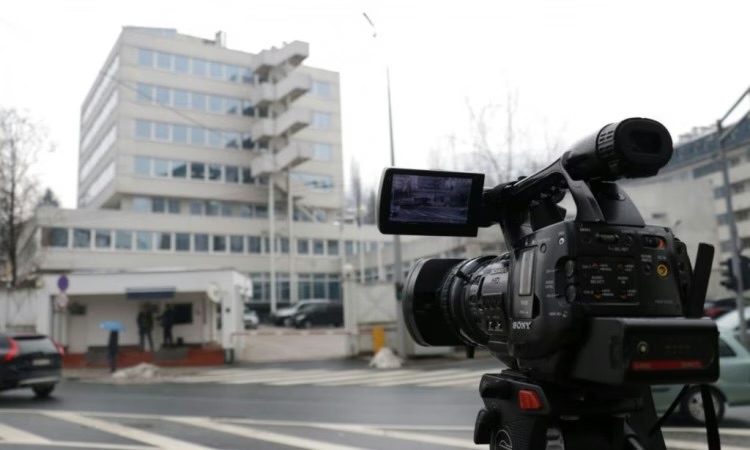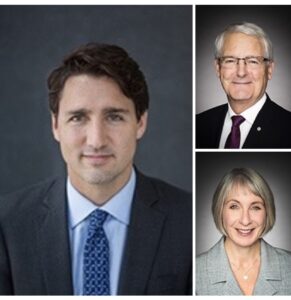2 October 2025
Peace Implementation Council
Steering Board
Office of the High Representative
Emerika Bluma 1
71000 Sarajevo
Bosnia and Herzegovina
Your Excellencies,
We are sending you an urgent appeal because of our concern about the threat to the peace in Bosnia and Herzegovina which has been caused by the recent actions and statements of Milorad Dodik. The current crisis risks no less than a repetition of the mass atrocities and genocide of the 1990s.
Mr. Dodik is undermining the rule of law by challenging his recent conviction and removal from office by holding a referendum. Following Dodik’s conviction, the Assembly of Republika Srpska further escalated the constitutional crisis by passing laws that rejected the authority of the state judicial and prosecutorial institutions within the entity of Republika Srpska. In addition, Mr. Dodik has alluded to at an additional referendum regarding secession and has sought and received pledges of support from the Russian Federation. All of these actions destabilizing the state, as well as the region, are a grave threat to peace and call for immediate action from the Peace Implementation Council.
Mr. Dodik’s sentence included a one-year prison sentence and a six-year ban from the office of President. Mr. Dodik paid a fine of approximately 18,660 euros, as a substitute for his one-year prison sentence, as is permitted by Bosnia’s Criminal Code. However, following the termination of his mandate by Central Election Commission, Mr. Dodik has organized a referendum on October 25 in Republika Srpska that will challenge his conviction and removal. The referendum reads: “Do you accept the decisions of the unelected foreigner Christian Schmidt and the rulings of the unconstitutional Court of Bosnia and Herzegovina issued against the President of Republika Srpska, as well as the decision of the Central Election Commission to strip the President of Republika Srpska, Milorad Dodik, of his mandate?” Such a referendum is a brazen rejection of the rule of law in Bosnia and Herzegovina. Respect for the rule of law is crucial for preserving constitutional democracy and preventing authoritarianism. Dodik’s referendum sets a dangerous precedent and should not be allowed to take place.
Immediately after Mr. Dodik’s conviction in the first instance verdict on February 26, 2025, the Assembly of Republika Srpska adopted laws rejecting all laws and decisions issued by the High Judicial and Prosecutorial Council, the Prosecutor’s Office of Bosnia and Herzegovina, the Court of Bosnia and Herzegovina, and the State Investigation and Protection Agency (SIPA). This was an intentionally provocative action aimed at further undermining the constitutional order. This was just one more provocation in a series of efforts to destabilize the state in advance of a referendum on secession.
Further, following the second instance verdict on August 1, a judgement that confirmed Mr. Dodik’s sentence and led to the termination of his mandate, the Russian Ambassador in Bosnia issued a statement condemning the verdict along with a thinly veiled threat. Mr. Dodik subsequently met Foreign Minister Lavrov in Moscow on September 9. Minister Lavrov issued a statement condemning Mr. Dodik’s guilty verdict as well as Western interference in Bosnia. Minister Lavrov reiterated President Putin’s support of Mr. Dodik and Republika Srpska, pledging continued diplomatic and economic relations. It has been President Putin’s official foreign policy to “unify orthodoxy” as he seeks to lend his full support to “brother peoples”. We are concerned that Mr. Dodik’s current actions would generate incidents that could lead to Putin opening another front in the Balkans.
The clear implication is that the Milorad Dodik, Republika Srpska and the Russian Federation are working together to undermine the rule of law and destabilize the Bosnia and Herzegovina as a sovereign state. Further, following a recent meeting with Mr. Dodik in Belgrade, Serbia’s President Aleksandar Vučić made the ominous declaration that Republika Srpska will “always have Serbia behind them and will be able to count on its support and assistance.” Hence, we send this urgent appeal to the members of PIC to take action to prevent a repetition of the mass atrocities and genocide in Bosnia. The referendum on October 25 should be prevented and the early elections called by the Central Election Committee November 23 to elect a new President in Republika Srpska should be supported. All necessary action should be taken to prevent further deterioration of the political situation, including the strategic deployment of EUFOR troops.
Thank you for your prompt action.
Sincerely,
David Pettigrew, Ph.D., CSU Professor, Southern Connecticut State University;
Satko Mujagić, LL.M., Former Concentration Camp Prisoner, Human Rights Activist, the Netherlands;
Emir Ramić, Director of Institute for Research of Genocide, Hamilton, Canada;
Munira Subašić, President of the Association of Mothers of the Srebrenica and Žepa Enclaves;
Bakira Hasečić, Association of Women Victims of War;
Murat Tahirović, President of the Association of Genocide Victims and Witnesses;
Samir Vranović, President of the Association of Kalinovik Truth, 92’
Safet Alispahić, Council of the Bosnian Community of New South Wales, Australia;
Ida Sefer, Bosnian American Genocide Institute;
Adil Kulenović, President of KRUG 99-Association of Independent Intellectuals;
Jasna Čaušević, Society for Threatened Peoples, Germany;
Patrick McCarthy, Working Group for Bosnia and Herzegovina, St. Louis;
Meho Kapo, Architect, MSA, Union of Associations of Citizens of Bosnia and Herzegovina, Sweden;
Lejla Pidić, Bosnian Cultural Center, Finland;
Adem Pobrić, President of the NGO “For Bosnia”, Brussels, Belgium;
Sonja Biserko, President of the Helsinki Committee, Belgrade, Serbia;
Azra Zornić, Holder of the status of a party before the ECtHR with a final judgment in the case
Zornić v. BiH, Member of KRUG 99, Retired Sociology Professor;
Adnan Mahmutović, Professor, Stockholm University, Sweden;
Dragan Bursać, Journalist and Writer;
Bert Bakker, Former Member of the Parliament, the Netherlands;
Chris Keulemans, Journalist and Writer, the Netherlands;
Christophe Buch, Director of Hannah Arendt Institute, Mechelen, Belgium;
Dr. Johan de Boose, Journalist and Writer, University of Ghent, Belgium;
Hariz Halilovich, Professor, RMIT University, Melbourne, Australia;
Srdjan Šušnica, Cultural Studies Expert;
Alma Mustafić, Srebrenica genocide survivor, lecturer and researcher at HU Utrecht, the Netherlands;
Jan Pronk, Former Minister and Member of the Parliament, the Netherlands;
Edin Osmančević, freelance debater;
Suzana Kadirić, Human Rights Activist;
Azra Muranović, Member of Swedish Parliament;
Dženan Čišija, Member of Swedish Parliament;
Erna Rijsdijk, Ph.D., research project leader of the Facing Srebrenica Project, University of Amsterdam / Netherlands Defense Academy, Signing in a personal capacity;
Dubravka Stojanović, historian, professor at the University of Belgrade, Serbia;
Senad Pećanin, lawyer, Sarajevo, Bosnia and Herzegovina;
Senada Šelo Šabić, scientific advisor, IRMO Zagreb;
Dijana Begović, journalist, Bihać, Bosnia and Herzegovina;
Esad Duraković, Arabist, professor emeritus at the University of Sarajevo, full member of the Academy of Sciences and Arts of Bosnia and Herzegovina;
Safet Mušić, Ph.D., security expert, Sarajevo, Bosnia and Herzegovina;
Kemal Balihodžić, journalist and publicist, Bugojno, Bosnia and Herzegovina;
Suad Haznadarević, researcher and publicist, Bugojno, Bosnia and Herzegovina;
Duhan Sirađ, author, President of the Bosnian Academic Society in Vienna, Austria;
Senadin Lavić, Ph.D., Professor at the University of Sarajevo, Bosnia and Herzegovina;
Hazim Bašić, Ph.D., Professor at the University of Sarajevo, Bosnia and Herzegovina;
Emir Medanhodžić, researcher and publicist, Sarajevo, Bosnia and Herzegovina;
Abdullah Daul, B.Ecc., Professor, University of Sarajevo, Bosnia and Herzegovina;
Fuad Đidić, Diplomat and Publicist, Sarajevo, Bosnia and Herzegovina;
Fuad Džaka, Ph.D., Security Expert, Sarajevo, Bosnia and Herzegovina;
Ahmed Kico, Security Expert, Sarajevo, Bosnia and Herzegovina;
Mulo Hadžić, publicist, Donji Vakuf, Bosnia and Herzegovina;
Emsuda Mujagić, Women’s Association Through Heart to Peace;
Ružica Čubela, Lecturer at University of Vienna and at International University of Sarajevo, Bosnia and Herzegovina.
cc.
Dr. Michael O`Flaherty
Office of the Commissioner for Human Rights
Council of Europe
Strasbourg, France
Mr. Volker Türk
Office of the United Nations High Commissioner for Human Rights (OHCHR)
Geneva, Switzerland
1


